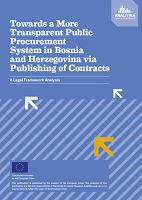Towards a More Transparent Public Procurement System in Bosnia and Herzegovina via Publishing of Contracts A Legal Framework Analysis
Towards a More Transparent Public Procurement System in Bosnia and Herzegovina via Publishing of Contracts A Legal Framework Analysis
Author(s): Stanka Pejaković
Contributor(s): Nermina Voloder (Editor), Mirela Rožajac-Zulčić (Editor), Mirza Purić (Translator)
Subject(s): Business Economy / Management, Law on Economics, Public Finances, Accounting - Business Administration, Commercial Law
Published by: Analitika – Centar za društvena istraživanja
Keywords: BiH; public procurement; system; contracts; legal framework; analysis;
Summary/Abstract: Public procurement contracts result from the need to use budget funds efficiently and to bolster free market competition. They are an instrument of the realisation of public procurement. Concluding a public procurement contract marks the beginning of a new stage of public procurement realisation (post-tender stage), in which abuses that adversely affect the efficiency of the public procurement system may appear, like in any other stage. That is to say, adverse economic impacts, such as corruption, nepotism or favouritism, are not necessarily connected with the pre-contract stage, they can also appear in the post-tender stage. Such abuses should be prevented by appropriate legal norms. In Bosnia and Herzegovina (BiH), public procurement contracting is regulated by the Law on Public Procurement (hereinafter: LPP), which regulates public procurement implementation procedures. However, it does not regulate public procurement contracts fully, thus many issues related to the conclusion and execution of contracts remain out of regulatory reach. For this reason, relevant provisions of the Law on Obligations are applied to public procurement contracts as subsidiary law. As a result, we see the problem of application of the disposition principle, as one of the fundamental principles of civil law, that is, the autonomy of the will of the parties in concluding and executing the public procurement contract, the application of which principle in public procurement processes should be limited by imperative legal provisions. The publishing of public procurement contracts is one of the questions which should not be left to the discretion of the parties but rather regulated by imperative provisions of the LPP. Although provisions on the publishing of the public procurement contract have been included in the LPP, these provisions are neither sufficiently clear and precise, nor sufficiently harmonised with the existing European standards. Such regulation brings into question the proper implementation of the transparency principle, as one of the basic principles of public procurement. Previous research in this field also indicates that the transparency of public procurement contracts is a sore spot in the public procurement system in Bosnia and Herzegovina. Using the facts outlined above as a point of departure, this study sets out to analyse thoroughly the question of the publishing of public procurement contracts with a view to strengthening the transparency principle, which does not figure very significantly in the valid legislation in BiH. The study is primarily based on the analysis of primary and secondary legislation which regulates the publishing of concluded public procurement contracts, as well as the publishing of changes to such contracts. At the same time it examines the issue of limiting the transparency principle by invoking the principle of trade secret protection. It analyses the provisions of the LPP which are regulated by imperative norms on account of their specific nature, but also the relation of these norms to the civil law norms grounded in the general regulation, i.e. the LO. Despite the tendency to see public procurement contracts through the lens of civil law contracts, the nature of the specific contractual relations inherent in the public procurement contract dictates a somewhat different approach to the execution of the public procurement contract, and a completely different approach to the publishing of the public procurement contract. Relevant European Union (EU) legal standards are also discussed herein, as well as examples of best practices from member states. The study goes on to give an overview of the main debates in the field, focusing on the wider significance of ensuring transparency of public procurement contracts, keeping in mind at all times the instrumental nature of this principle. In the part devoted to the publishing of public procurement contracts, it overviews international standards focusing on relevant EU regulations, as well as on a comparison of experiences of member states which stand out as examples of good practices, especially countries from the region (Croatia and Slovenia) which have joined the EU. The study analyses the legal framework which regulates the publishing of public procurement contracts and the changes to such contracts in BiH, with a view to highlighting the key aspects – the positive sides of these contracts and their lack of transparency. It also discusses possible restrictions to the application of the transparency principle to the protection of confidential information of entrepreneurs – economic operators engaged in public procurement processes. The conclusion sums up the results of the analysis, and goes on to offer suggestions for the improvement of the existing normative framework to the publishing of the public procurement contract and the changes to it in the course of its execution.
Series: Analitika - Report
- Page Count: 40
- Publication Year: 2016
- Language: English
- Content File-PDF
- Introduction

